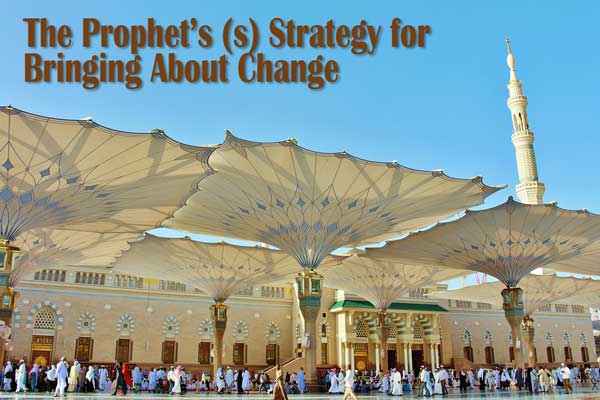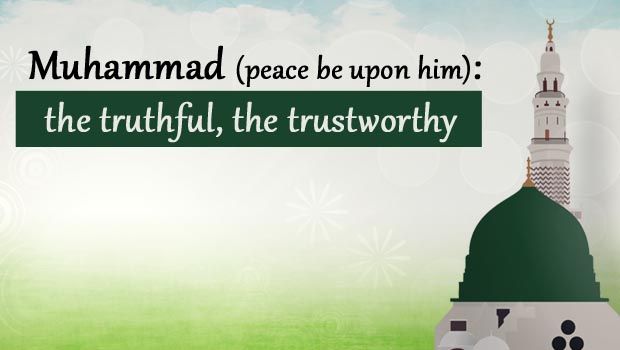All praises are for Allah, The Almighty, and may His peace and blessing be upon His true servant and final Messenger Muhammad, on his Companions, and his family.
One of the greatest achievements of Rasoolullah (s) was the way he transformed the Arabian society. Within 23 years of the start of his mission, Islam had become the way of life for most of Arabia. Knowing this awe-inspiring achievement, one asks how an entire society which, at first, was hostile to Islam and hostile to Prophet Muhammad (s) not only embrace Islam but defend it with their lives and their wealth. They were transformed from enemies of Islam to becoming the torchbearers of Islam.
That first generation was known as the unique generation and the best generation of this Ummah. Rasoolullah (s) prepared them in such a way that many of them became leaders, and by the end of the Khulafa’ee Rashideen (the rightly-guided khalifs) period, Islam had reached Palestine, Syria, all of Mesopotamia, Persia, North Africa, Cypress, Europe, and China. This great achievement happened, first and foremost, by the Will of Allah SWT, and then with the selfless dedication, commitment, and great leadership Rasoolullah (s).
What is also very amazing is the manner of such transformation when there was no mass media or technology like we have in modern times. The challenge for the Ummah today is how to use the Sunnah of Rasoolullah (s) to bring about positive changes in a world so filled with distress, conflict, and oppression. Today’s world is characterized by an unstable environment and an uncertain future. How eager is the world awaiting someone, some group, or some divine guidance to deliver it from its woes? How badly is the need to eradicate the evils of hatred, fascism, exploitation, racism, and injustice! Moreover, mankind now faces a public health devastation the likes of which has not been witnessed for almost one century: the COVID19 pandemic.
Imam Malik (may Allah’s mercy be on him) said, “The latter generations of this Ummah will never be rectified except by means of that which rectified the earlier generation” (Majmoo’ Al-Fataawa by Ibn Taymiyyah). In examining the approach of Rasoolullah (s) in bringing about such positive changes, there are two main areas of focus.
The first is the individual effort which covers the following:
a) clarity about the mission
b) firm faith and taqwa
c) justice and mercy
d) genuineness
e) being pro-active
f) dedication to Allah and sincerity
The second area is the collective effort, and this includes the following:
a) brotherhood and love
b) mutual consultation
c) collective discipline
d) constructive criticism
The Individual Efforts Exemplified by Rasoolullah (s)
At the individual level, one of the fundamental focuses of Rasoolullah (s) was to provide clarity about his mission. Lack of direction gives way to confusion and doubt. Allah SWT says in the Qur’an, “He it is Who has sent His Messenger with guidance and the religion of truth to make it clear over all [other] religions even though the Mushrikûn [those who associate partners with Allah] hate [it]” (61:9).
Rasoolullah (s) took every opportunity available to him to explain the Deen of Allah to humanity. He trained the best of the Ummah, making it clear that this mission is about the Creator and what He SWT wants from His creation. Even when pressed by Quraish to make compromises on faith, he stood firm about his Islamic mission, never wavering.
The second point to note was the emphasis Rasoolullah (s) placed on taqwa (piety which includes humility; being conscious of Allah’s presence; and fearing Him at all times), not only for the leader but also for every believer. It is the only criterion by which people are judged in Islam. Allah SWT says, “O mankind! We created you from a single [pair] of a male and a female, and made you into nations and tribes, that you may know each other. Verily the most honored of you in the sight of Allah is the most righteous of you. And Allah has full knowledge and is well-acquainted” (Qur’an 49:13).
Power and authority can easily make a person arrogant. While taqwa is much more than being humble, it is among the many meanings of the term. Humility is especially important for a leader since he is entrusted with the affairs of the community. Not seeking a leadership position is part of taqwa. One sees from the Seerah (biography) of the Prophet (s) that his personal honesty and integrity had already earned him the title of al-amin (the trustworthy one) in Makkah, even before being commissioned as Prophet. Similarly, modesty and humility were apparent in the conduct of the Khulafa ar-Rashidoon, rightly-guided successors, referring to the first four khaliphs following the death of the Prophet (s).
In his first speech as khalifah of the Muslims, Abu Bakr Siddiq proved himself an ideal of modesty and humility. There was total absence of the kind of arrogance as can be found in modern-day rulers when they assume power. In his acceptance speech, Abu Bakr (r) said, “O People! Here I have been assigned the job of being a ruler over you while I am not the best among you. If I do well in my job, help me. If I do wrong, correct me. Truthfulness is fidelity and lying is treason. The weak shall be strong in my eyes until I restore to them their lost rights, and the strong shall be weak in my eyes until I have restored the rights of the weak from them. No people give up fighting for the cause of God, but God inflicts upon them miserable subjection; and no people give themselves to lewdness, but God envelops them with misery. Obey me as long as I obey God and His Prophet. But if I disobey God’s command or His Prophet’s, then no obedience is incumbent upon you. Rise to your prayer, that Allah SWT may bless you.”
The third point to note in the individual effort of Rasoolullah (s) in bringing about such positive change is his justice and compassion throughout his mission. In order to bring about changes in the world, the Muslim Ummah must exemplify the qualities of ‘adl (justice) and rahmah (compassion) as demonstrated by Rasoolullah (s). Justice and compassion go hand in glove. Rasoolullah (s) was relentless in his pursuit of fairness and justice. As Allah SWT commands: “O you who believe! stand out firmly for Allah, as witnesses to fair dealing, and let not the hatred of people make you swerve to wrong and depart from justice. Be just— that is next to piety, and fear Allah. For Allah is well acquainted with all that you do” (Qur’an 5:08).
In very clear terms, Rasoolullah (s) voiced his commitment to justice. Aisha (r) reported: “The Quraysh had been anxious about a woman who had committed theft and they said, ‘Who will speak to the Messenger of Allah about her?’ Some said, ‘Who would dare to but Usama, one beloved by the Messenger of Allah?’ Thus, Usama spoke to him and the Messenger of Allah, peace and blessings be upon him, said, ‘Do you intercede regarding a punishment prescribed by Allah?’ The Prophet then stood up and addressed the people, saying, ‘O people, those who came before you were destroyed because if a person of high status committed theft among them, they would spare him, but if a person of lower status committed theft, they would apply the punishment upon him. By Allah, if Fatima, the daughter of Muhammad, were to steal, I would have cut off her hand’” (Muslim).
As to compassion, the greatest testimony to that is Allah SWT saying in the Qur’an, “And We have not sent you [O Muhammad], except as a mercy to the worlds” (21:107). Abu Hurairah relates that Rasoolullah (s) kissed his grandson Hasan ibn Ali. Aqr’a ibn Habis, who was with him at the time, said, “I have ten sons and have never kissed any of them.” The Prophet looked at him and said, He who has no compassion will receive none” (Bukhari and Muslim). The Seerah of Rasoolullah (s) is full of accounts and descriptions of his compassion for the people.
Another aspect of the approach of Rasoolullah (s) to bring about change in society was his authenticity and genuineness in character. His entire life has been documented and preserved in a manner unmatched by any other person’s biographical account. And this was done at a time when all documentation and recording was done by hand, and even writing paper was very scarce. This body of information is known as the ahadith. These record the actions, statements, acknowledgements, and descriptions of Rasoolullah (s). All of this was documented, mostly by memory at first, and later codified by various hadith collectors, and preserved for all time. Rasoolullah’s Seerah covers all aspects of human life, from the most sublime such as beliefs and rituals of worship to the most practical such as details about cleanliness of the body.
The next aspect of the individual qualities of bringing about change is getting involved in social justice issues, eradicating social illnesses, and empowering the underprivileged. These were some of the hallmarks of his activism even before prophethood. An example of that was the “Hulf al-Fudool,” a pact he helped to establish in Makkah before his prophethood. A powerful Makkan merchant cheated a trader from Yemen out of his fair due. The Yemeni made his claim in the Kaaba. A group of notables, among them young Muhammad, vowed to restore his right and thereafter that of anyone else who was wronged. The dedication of Rasoolullah (s) to social justice was testified to by his first wife. When he was given the first revelation, he became frightened and upon reaching home, he confided in Khadijah (r) about his encounter with Angel Jibreel (as). She calmly responded to him: “I swear by Allah that He shall never humiliate you. By Allah, you keep good relations with your kith and kin, you speak the truth, you bear people’s burden, you help the destitute, you entertain guests, and you help against the vicissitudes which affect people” (Muslim).
Finally bringing about change at the individual level calls for dedication to Allah SWT with utmost sincerity. Rasoolullah (s) was always in a state of dedication to his Lord through prayer, fasting, charity, and with the most virtuous words and actions. He would pray till his knee would get swollen and when asked why so much worship when he is already granted forgiveness from his Lord, he simply replied, “Shall I not be a grateful servant?”(agreed upon). Throughout his entire life, he was known for his sincerity, even among his enemies. When Heraclius, the Byzantine emperor, questioned Abu Sufyan (who was not yet a Muslim) about the integrity of Muhammad (s), he had only the best characterizations to state about him. Later on, when Abu Sufyan became a Muslim, he related the details of the questioning and his answers about the sincerity of Rasoolullah (s).
The Collective Efforts in the Approach of Rasoolullah (s) in Bringing About Positive Change
Rasoolullah’s life was the best example of superlative personal character. He also, however, fully established, and showed by his example, the necessary efforts on a collective level in the efforts to bring about positive change,
He taught, facilitated, and exemplified brotherly and sisterly love. He engaged in mutual consultation with his companions, demonstrating for all of us the way of cooperation, unselfish persuasion, and principled advocacy. He was always looking to unify the people, engaging them in the affairs of the community with the aim of guarding and enhancing the common good. He showed his companions, and by extension us and the whole of humanity, how to be disciplined on the individual and collective levels. This entails dedication to truth, striving for self-awareness, and practicing self-restraint, and encouraging the same in one another. He also exhibited the greatest ability to offer constructive criticism, to correct others without blaming or indulging in a sense of superiority or self-righteousness.
Changes cannot be come about until and unless the Muslim individual and the Ummah as a whole strive to exemplify, through their lives, the teachings of Muhammad (s). Praising him at particular times does not represent being a true follower of Muhammad (s). The true follower will strive to revive the Sunnah of Rasoolullah (s). He will call others to be part of this movement that brings about good in society. He will walk the walk of Rasoolullah (s). Ibn Umar (r) used to put a slight bounce in his walk because he said this is how Rasoolullah (s) used to walk. He used to rest under a particular tree because he said Rasoolullah (s) rested under that tree. These examples simply show how the Companions were so eager to emulate Rasoolullah (s).
The Sahabah (r) were the keenest to exemplify the way of Rasoolullah (s) and thus, after his passing, they took Islam with the same spirit to the whole world. In this pandemic and global disarray, the world needs men and women who can truly demonstrate the teachings of Rasoolullah (s) and bring wisdom and justice and mercy back to the forefront. The good thing in our time is that we have the means to communicate to the whole world, and we can present and represent Rasoolullah (s) to the whole world with the click of a button. Each and every one of us can spread the message of Rasoolullah (s). From our own living rooms, we can reach out to the world and let them know of the greatest benefactor to humanity: Muhammad Mustapha, salallahu alaihi wa salaam.




